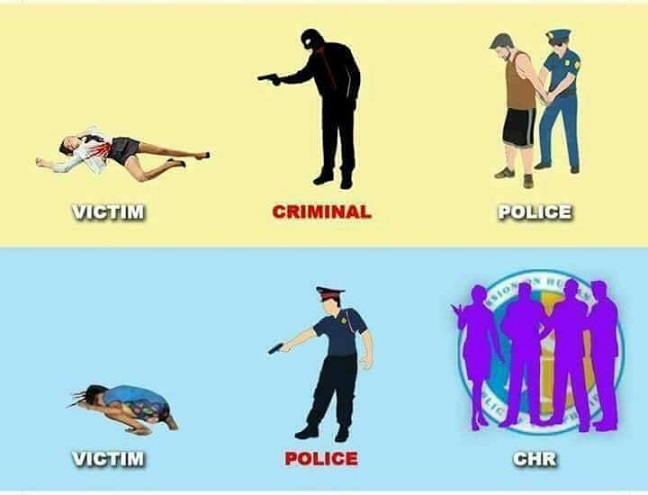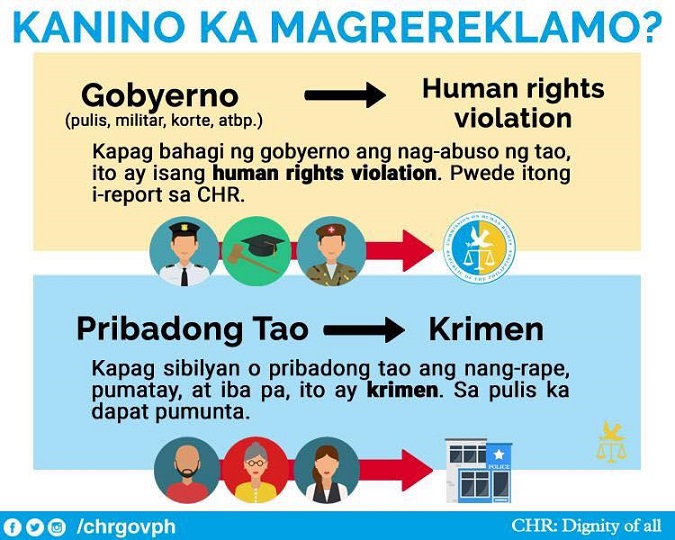When the House of Representatives voted 119 against 32 last Tuesday to give only P1, 000 budget for the Commission on Human Rights for 2018, it showed that stupidity is not the monopoly of its speaker.
Lambasted in social media, some of the congressmen who voted “Yes” have started explaining their vote and they all showed their ignorance of the mandate of the CHR just like Alvarez.
Alvarez lambasted the CHR for not running after those who killed the policemen, military and government officials.
“Kailangan nilang protektahan at pangalagaan ang karapatang pantao ng sinuman, di lang isang sektor, di lang sa karapatang pantao ng mga kriminal, pati ang innocent victims. Kumikibo lang sila kapag against the military, against the police, against government officials. Hindi naman ganun ang mandato nila. Ang mandato nila ay lahat ng karapatang pantao ay protektahan nila at pangalagaan,” he said.
Actually, Alvarez and the 119 congressmen who voted to strangle CHR by withholding funding , are not the only ones who are misinformed of the role of the Human Rights Commission. They are actually only echoing the ignorance that President Duterte has been articulating in many of his speeches.
VERA Files has written an Explainer about the Commission on Human Rights (http://verafiles.org/articles/vera-files-fact-sheet-commission-human-rights-explained) and I’d like to share excerpts of that here:
What is the CHR?
It is an independent government body which, as its name suggests, looks into the human rights dimensions of cases, and violations of human rights perpetrated by both state- and non-state actors.
The 1987 Constitution itself has provided for the creation of the CHR. The body was effectively created on May 5, 1987, when former President Corazon Aquino signed Executive Order 163.
The Constitution tasks the CHR to among others “investigate, on its own or on complaint by any party, all forms of human rights violations involving civil and political rights.”
What does the CHR really do?
The CHR is an investigative and recommendatory body. It does not file and adjudicate cases.
“It cannot try and decide cases (or hear and determine causes) as courts of justice, or even quasi-judicial bodies do,” the Supreme Court noted in a 1991 decision.
If the CHR finds in its investigation that human rights violations were committed, it makes recommendations to the appropriate government body that has jurisdiction over the case.
In 2012, for example, the CHR in a resolution following a public inquiry recommended that the Office of the Ombudsman investigate Duterte for “possible administrative and criminal liability,” because of his alleged inaction on killings committed by the so-called Davao Death Squad. Duterte was mayor of Davao City for 22 years.
The Ombudsman in 2016 terminated the case for lack of evidence, but will reopen it following the filing of a criminal complaint against Duterte by self-confessed hitman Edgar Matobato.
The CHR also checks whether the government complies with international treaties, including the 1948 Universal Declaration of Human Rights, to which the Philippines is a signatory.
More, it can exercise “visitorial powers” over prisons and jails, as it did last April, when it found a hidden detention facility in a police station in Tondo, the existence of which is forbidden by the Constitution.

VERA Files also fact-checked the President’s statement that CHR defends criminals and only has criminals for clients (http://verafiles.org/articles/vera-files-fact-check-duterte-says-chr-defends-criminals)
The commission sent VERA Files a list of cases it says it has “investigated and resolved, that involve victims and/or complainants other than criminals or has a criminal case.”
The list includes:
The Maguindanao Massacre, where 58 people, including 32 media workers, were killed months before the 2010 elections. The CHR found that the killings amounted to grave violations of the Philippine Constitution and the Universal Declaration of Human Rights. It recommended among others that financial assistance be provided to the families of the victims.
The January 2013 killing of San Pablo City Councilor Edgar Adajar by a lone gunman, which the commission found to be a possible case of extrajudicial killing. The case is now pending before a trial court.
A case of violence against women and children (VAWC), upon the complaint of a mother from Cavite against the father of her daughters, for avoiding his parental obligations. The CHR arranged for a dialogue, where the father eventually admitted to his failure and promised to provide financial assistance.
Recently, the CHR has also taken custody of Efren Morillo, who survived an Oplan Tokhang operation on August 2016 in Payatas, and became a witness in the first legal action filed by a civilian against the government’s anti-illegal drugs campaign.
The simplest explanation about CHR’s role was made by CHR Commissioner Leah Tanodra-Armamento in a radio interview Tuesday. She said: ‘”Kung ang kapitbahay mo ang pumatay, police matter ‘yan. Kapag umabuso na ang pulis or other security sectors, kanino ka tatakbo? Tatakbo sa human rights commission.”
Mahirap ba intindihin yan?

Be First to Comment